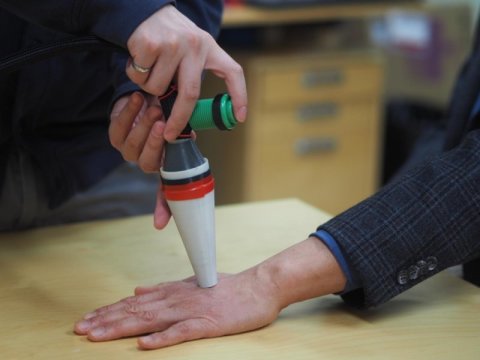Researchers have long believed that Propionibacterium acnes causes acne. But these bacteria are plentiful on everyone’s skin and yet not everyone gets acne, or experiences it to the same degree. Genetic sequencing recently revealed that not all P. acnes are the same — there are different strains, some of which are abundant in acne lesions and some that are never found there. Still, acne research and therapeutic development have been hampered by the lack of an animal model that replicates the human condition. When administered to mice, for example, P. acnes don’t cause long-term skin lesions…
Read MoreCategory: Skincare
Low-cost ‘cancer probe’ could spot deadly melanoma early
Melanoma, the deadliest form of skin cancer, is diagnosed in more than 130,000 people globally every year. Now, work is being done on a tool to help in its early detection: a simple, compact laser probe that can distinguish between harmless moles and cancerous ones — in a matter of seconds. “With skin cancer, there’s a saying that if you can spot it you can stop it — and that’s exactly what this probe is designed to do,” said researcher Daniel Louie, a PhD student who constructed the device as…
Read MoreSeawater bacteria provides leads to fight melanoma
Malignant melanoma can be a particularly dangerous form of cancer, and more therapeutic options are needed. Now, researchers report in ACS Medicinal Chemistry Letters that a bacteria from seawater has inspired promising leads for an entirely new way to treat the disease. In melanoma, cancer cells form in melanocytes, the cells that color the skin. While new cases of most types of cancer are declining, those of melanoma — the deadliest form of skin cancer — continue to climb, according to the U.S. Centers for Disease Control and Prevention. If melanoma metastasizes,…
Read MoreElectrifying wound care: Better bandages to destroy bacteria
Bandages infused with electricity can help heal wounds faster than typical bandages or antibiotics — but for years, researchers have not really understood why. A recent study by a team at The Ohio State University is offering new clues about the science behind those bandages, and researchers say the findings could help lead to better wound treatment. The bandages belong to a class of therapies called electroceuticals, which are devices that use electrical impulses to treat medical issues such as wounds. The study, published online recently in the journal Scientific Reports by…
Read MoreCutting the legs off cancer
Melanoma skin cancer tumors grow larger and are more likely to metastasize due to interactions between a pair of molecules, according to experiments in mice and human cells. The results may restore the potential for a type of cancer therapy previously abandoned in clinical trials. The results also implicate one molecule already connected to obesity and dementia as a potential cause of metastasis, or spread of cancer cells to other areas of the body. Melanoma accounts for about 1 percent of skin cancers, but causes a large majority of skin…
Read More

